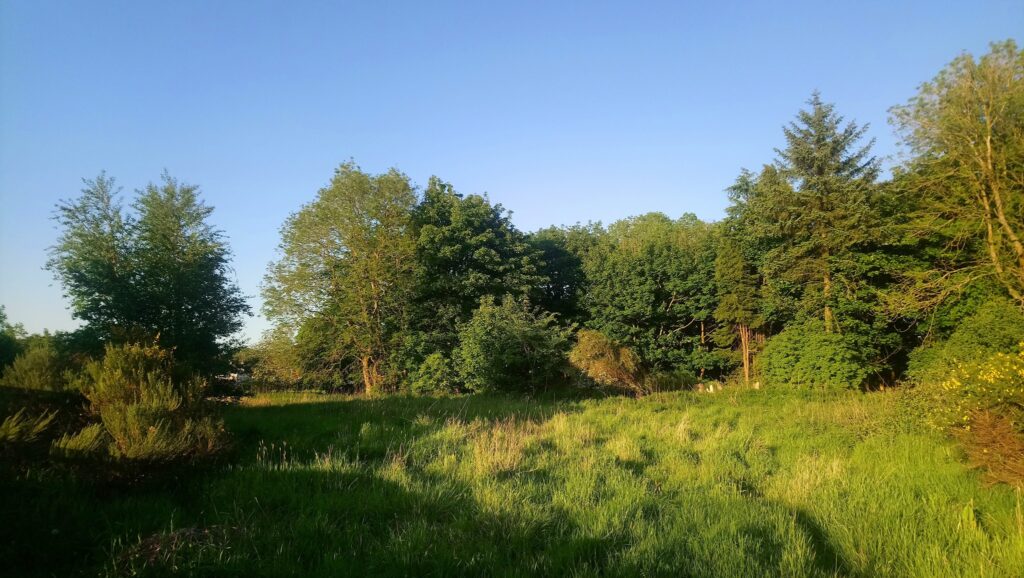Murieston Valley
In the Murieston Valley, Livingston lies a vacant plot of about 14,500m2 land – about the size of two football pitches. The site is contaminated from its historic use as a dump for Edinburgh’s incinerated domestic waste in the early 1900s.
Today it’s a valued local greenspace with woodland at the end of the Tarbert Drive residential community.

In 2018, a planning application to build 18 houses on this contaminated land was made to the West Lothian local authority but was rejected.
However, the developers who lodged the application appealed the decision and, upon review by a reporter from the Division of Planning and Environmental Appeals (DPEA), the application was approved.
The Murieston Community Council (MCC) and concerned residents raised 16 concerns about the reporter’s decision for approval. The concerns were about the significant health impacts of developing on contaminated land without the necessary precautions and the removal of ancient woodland.
Specifically:
- No evidence of the claim that the Scottish Environmental Protection Agency (SEPA) was satisfied with the additional work requested to make good the contaminated land
- Not all contamination would be removed so a protective cap and an anti-puncture membrane with a limited lifespan would be used on top of the contaminated soil
- Gross underestimation of the number of lorry movements from the development and the impact on the surrounding residents
- Removal of 125 trees including ancient woodland and replacing them with only 70 trees
- Claims of tree felling not threatening biodiversity and the core of the ancient woodland without an Environmental Impact Assessment
- Unclear statements of ‘clearly defined public benefits’ for the development.
As the planning application had been approved by the DPEA MCC’s only option was to challenge the decision through a judicial review in court on the grounds that the procedures for granting the planning permission were unlawful. The MCC was notified that this was their only option after they requested an independent review from the Minister for Local Government, Housing and Planning.
“I found it wasn’t about the potential harm of the contaminated land to people, but it was about the process. If it was found that they [DPEA/developers] had followed the process we would lose, it was nothing about ethics… The judicial review costs about £70,000, too big for a community council, the costs were prohibitive.”
MCC found it difficult to get legal advice from legal firms and cost wasn’t the only reason. Legal firms with specialists are often used by major developers which meant that the MCC could not ask for legal advice because of a conflict of interest.
This is when the MCC came to the Environmental Rights Centre for Scotland’s free legal advice service. The enquiry was on the cost of the judicial review and whether they would be able to challenge DPEA’s decision to approve the developer’s appeal.
“We didn’t have the money for the legal advice we needed. (ERCS) spent a lot of time on our case and they got a QC who reviewed the paper about the viability of going to court with it.”
The advice was that the case might not be strong enough to prove the reporter didn’t follow due process. Following pressure from the community, the West Lothian local authority also had the case reviewed by a lawyer who gave the same opinion. The cost of going to court was far too great a risk for either the community council or the West Lothian local authority.
“We basically rolled over and had to accept it. It’s the financial side that inhibits the small man from doing something. We would like to see legal aid for community councils”
Planning Secretary, Murieston Community Council – Interviewed by Cornell Hanxomphou, ERCS Rights Officer August 2022
What needs to change?
We all have the right to a healthy environment and and non-toxic environments in which to live, work, study and play.
1. Reform of legal costs
ERCS is campaigning for reforms on legal expenses so that it is affordable for all of us to uphold our right to a healthy environment
We welcomed the Scottish Government’s decision in July 2021 to remove court fees for some environmental cases, but much more is needed.
This includes:
- Reform of legal aid so that it is available for individuals and groups to go to court as a last resort
- Replace the ‘loser pays’ rule with qualified one way costs shifting for environmental cases.
2. Equal rights of appeal
Working with Planning Democracy and supported by Friends of the Earth Scotland and RSPB Scotland, ERCS has submitted a complaint to the Aarhus Convention Compliance Committee that planning appeal rights in Scotland are not ‘fair’ and therefore in breach of Article 9(4) access to justice requirements.
For more information on our recommendations for an enforceable human right to a healthy environment, read our Advocacy Manifesto or one page summary.




